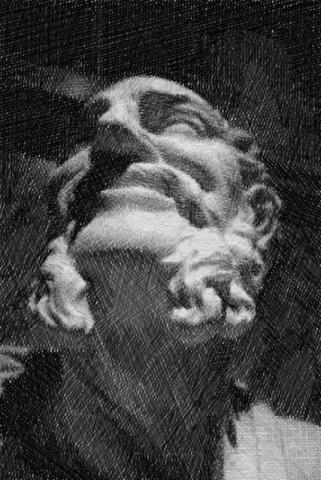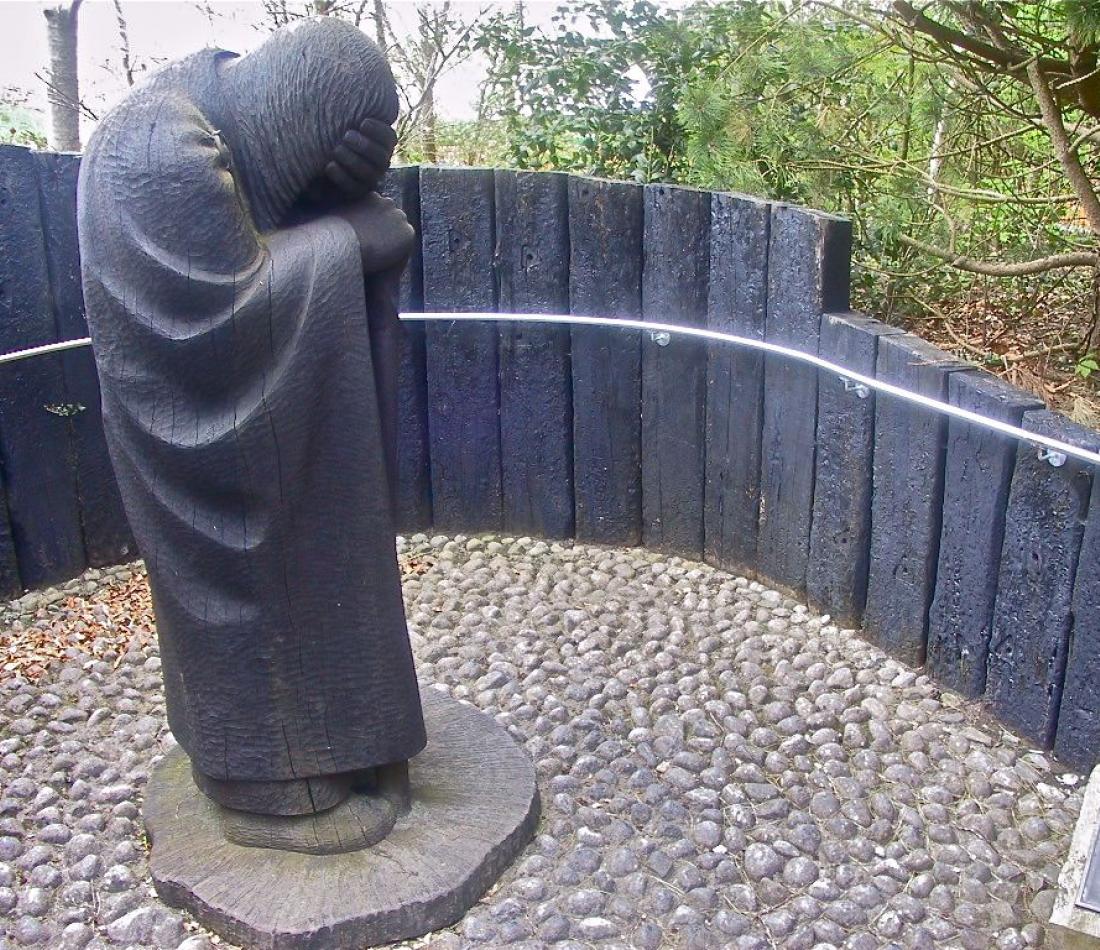Category:
The photo is from the Albert and Victoria Museum in London, England.
I have never been one who liked to spend much time writing letters or sending Christmas cards. One Christmas, I astounded my friends and family members by sending out Christmas cards. My brother-in-law upon returning home from work was met by his son at the door with the question, “Guess who sent us a Christmas card?!” His dad began naming all whom it was likely or could possibly be. Was at a friend, a family member? He narrowed the list down to the area where I live until, having gone through the list of everyone he could think of, he finally exclaimed – “Not uncle Laurie!!!” He was still laughing when he phoned that evening to share with me the story and to inquire about my ‘conversion experience.’
God sends cards of greeting and love in the form of gracious experiences, the encouraging words of others, the written words of Scripture and to our world through the fullness of revelation that is in Jesus. Everywhere – in nature and in Scripture, God professes his love for us. He has our good in mind; He has, and continues to put Himself out, so that we might have a new life of fulfillment and fullness in this world and the next.
Longing to go deeper.
Some of us long to come to know more fully the God who Jesus addressed in his prayers as “Abba” – “Father,” who spoke to God just as a child or young man or woman, hopefully, would speak to his or her father, with confidence and a sense of security and love, but also at the same time with a sense of reverence and a proper desire to obey. God as Father; that is not good news to some whose fathers have been abusive or ‘not there’ for them. But what is God really like? Francis Bacon wrote, “It is better to have no opinion of God at all then such an opinion as is unworthy of Him.” It is important to put away all unworthy conceptions of the author of the wonderful story revealed in Scripture and in the gospel of Jesus, and to become acquainted with the gracious character of God who desires a relationship with His creatures.
A great deal is wrapped up in this fundamental presupposition that this God, a great Storyteller, the Author of history and of our Faith, really is present and near to us – the God Who in Christ became Emmanuel: ‘God-with-us,’ in the here and now, because He really loves us. Contrary to some opinions, this world and the universe is not all there is that is real. There is a Source and a Ground of every object and being in the world and nothing in the world can be properly apprehended unless it is related to this divine person.
We can only point to his goodness in our own lives.
Someone has written – was it C.S. Lewis? that “It is impossible for us to demonstrate the existence of God as it would be for Sherlock Holmes to demonstrate the existence of Arthur Connor Doyle. In the last analysis, you cannot pontificate, but only point.” The existence of the world itself and every aspect of it is an expression of God’s purpose full activity. The world we live in is a created reality alongside God, enjoying relative autonomy, yet completely dependent on God for its meaning and existence. Most wonderfully, the creator God is proclaimed by the Christian Story as the One who overflows in love toward God’s creatures. This God is not far off, distant and aloof, but one who cares about us, and even sacrifices his own interests in order to help us.
This God of this Story declares himself to be our God, to be for us. This is the source of all that is precious, the basis of the good news of the Story. God reveals himself as One who gives Himself to humankind and calls us to share in the richness of God’s own being and glory.
Former UN Secretary Dag Hammarskjold wrote in his journal, “Markings,” these words:
You take the pan and the lines dance,
You take the flute and the notes shimmer;
You take the brush and the colors sing,
So all things have meaning and beauty in that space beyond time.
How then can I hold back anything from you?
Here is a love that excels anything we know on earth in natural human experience – a love freely given, from One who is higher to those who are lower. I am moved by the way in which Soren Kierkegaard prayed:
Father in heaven! Thou hast loved us first.
Help us never to forget that Thou art love
So that this sure conviction might triumph in our hearts
– over the seduction of the world,
– over the inquietude of the soul,
– over the anxiety for the future,
– over the fright of the past,
– over the distress of the moment.
Emerson Fosdick wrote that “communion with God is a great sea that fits every bend in the shore of human need.” God says He loves us and, as David Livingstone put it, “It is the word of a ‘Gentleman’ of unassailable honor.” God is the one who runs out down the lane, the father who is excited, weeping, welcoming, when he sees his prodigal son – or daughter, stumbling homeward, perhaps reeking, still, of pig swill. Though his or her past has revealed a spirit of rebellion, impatience, greed and open desertion, and now feeling beaten and weary, a despondent failure, the son or daughter are still welcomed once more into the father’s house, invited again to sit and feast at the father’s table. Forgiveness does not depend upon our cleaning ourselves up before the father can love us and welcome us home again, for God is not finally frustrated by our sins, whether great or small, just as he is not impressed by our supposed acts of righteousness.
If we could only get it into our heads how much He loves us and longs to help us, how much He wants to give to us all that has been lost, and of all that He has done to make possible our restoration back into His home (ultimately this-here world, which too is to be welcomed as it were, cleansed, fitted aright and fully restored), to be drawn into the deep care and compassion of His heart. We are brought into a royal position in God’s Kingdom realms, as we return to God and find ourselves restored once more as those whom God created just a little lower than angels. Human flourishing again and a world restored once more. It is only by grace that anyone sits with Him again at table, or walks with him in the cool of the evening in this world, God’s garden.
We are not making this up.
This is not to say that there are no difficulties in the Story, in our understanding or in our receiving, for there are times when no one seems to be home, that ‘no one is there.’ Our prayers seem unanswered, loved ones tire, sicken and die; we look on and we look up but God seems to be looking away. All the people in the Story have troubles; they all know times of despair when in honesty, if they can be honest, they cry, “Where are you! Why are the bad guys prospering? Why this? Why now? What’s going on? My God, my God – why?! If we were making this up we would have made it more easy, racy, ready and accessible. We would look for something or someone to be write and to be characters in whose ways life was more palatable, with a plot and characters more suited to our natural inclinations and desires, our ways of handling life. But if we are faithful to the Message of this Book, this Story, and if we believe that through it all, after all, it is a Love Story, a song, a grand epic Poem, then we must look at it as the Story we did not, and could not, make up nor write.
We may not perceive love in the Story, at least not in some parts, and there are many that remain difficult to fathom or understand. We must confess that most of the time we are quite indifferent to the message, just as many of us do not take time to actually read the verses in cards we received a Christmas or birthdays. The trite sentiment doggerel puts us off, perhaps, whatever the well-meaning sender intends. I began once, after a retreat the profoundly touched my life and, I believe, changed it for the better, to write wee notes of encouragement and appreciation to colleagues in ministry, present and past, and to family members and friends. My notes and cards were received of course quite out of the blue, as unexpected, their not having before ever received such notes from me. A few responded with appreciation; no doubt others wondered what I wanted or what possess me to do such an unusual, for me, thing.
Sometimes we reduce the great truths and facts of the gospel, this revelation of God’s loving purposes, too trite forms, formula and sentiment. It comes to us as not quite ringing true, like the child’s ditty –
I sent a letter to my love but on the way I lost it;
A little doggie picked it up and put it in his pocket.
The story comes to us perhaps as something whimsical, even interesting, but we perceive it as something more for children, or for weak, trying-to-be-good, gullible souls, for religious sorts or for those looking to escape this or that problem or pressure of life, taking solace in these trite forms, expressions, fables and opinions. Somehow it does not seem to be for us. It is unimportant and we have too much of import and expectation at hand that we must do. Other stories, our immediate stories, seem more real than this story, even if it were to be – The Story. We do not hear an inner ear nor receive it into our deep and inner self. But still for others, there is a longing within that this be true.
And Warden of my soul’s stained house, where
love and hate are born,
Oh, make it clean, if swept must be with
pain’s rough broom of thorn!
And quiet impose, so straining ears with
world–din racked and torn
May catch what God doth say.
I think we find it most difficult to get into our heads let alone into our hearts, that God loves us; That He means our good and not evil, That His laws are given to point the way to freedom and His Spirit given to make possible our entry into the freedom to which the laws, as to His ways and the best for us all, point — to what otherwise we could only hope for and long to see. God can do all things: even make any and all opposition, anger and evil that we and our world set up against Hm and against our neighbour and ourselves. To everyone’s surprise and for all of us our great blessing, He makes good come out of even the greatest evil, pain and loss. He takes tangled threads of the knotty tapestries and all the broken shards and pieces of rough-hewn vessels of life, ours and of our world, and makes pictures and pottery that stun with rich hue and beauty. If not first in his plan, each catastrophe, illness and setback He allows can still be worked into the common good of our individual and corporate lives, and of all life on this planet.
In all of it God is at work, and He will work, fixing and commanding, listening and responding always to our prayers. He may use in and through us what we have discovered in medicine, science and technology where and when and how it may be most helpful, for never let us think that what happens surprises him or that He cannot fit it into His plans, and make it for his glory and for our greater good.
High as the sun and stars above
Are the Fathers plans of love –
Beyond our comprehension.
No human mind could e’er conceive
The plans by which the Father leads
His dear ones, His own.
When we really do discover this Message of Love and take it within ourselves, we will find that we cannot be silent: we must show and tell it to others. The psalmist writes –
I will sing of the Lord’s great love forever;
with my mouth I will make known your faithfulness through all generations.
I will declare that your love stands firm forever;
that you established your faithfulness in heaven itself.
What a noble pursuit is this, to tell of the love of God, to relate the stories of His compassion and care, of His great faithfulness, to this and to future generations. We will be showing, writing, singing, painting, dancing it out to family, friends and even to enemies and strangers. Nobody, nothing can stop us. We cannot be silent nor can we hide it. With the Spirit’s help, we will describe it and live it as best we can. C.S. Lewis wrote that ‘if the most beautiful musical phrase imaginable could be made into a word, then the word would be an adjective, not a noun. It would describe something more splendid still; it would be one beauty pointing beyond itself to the ultimate Beauty.’ That’s it! says Maurice Boyd – “All my life has been the finding of magnificent adjectives describing a Glory I have not seen.” He will have begun to see it now, I’m sure, having passed into the Presence of God some years ago now, into that place that he so often called, “the Bright Country.”
At the beginning of each Church Year, the beginning of the Advent season, the curtain goes up once more on the Play, the Drama — on The Story of a Saviour’s Love. We rehearse and remember it again. It is never old, never too much. Above everything else, we can note that the Author, who has entered the Drama in the Person of Jesus of history, is One who loves us deeply and profoundly, who cares for each one of us more than we can tell. We long to perceive and receive this blessing anew as sheer grace, the gift of God that it is. As we tell the Story of Love, we overflow with praise and gratitude and find as we tell it, and wait and work, through patience, love and good works, our brothers and sisters are drawn to love and serve Him to.
Blessed are those who have learned to acclaim you,
Who walk in the light of your presence, oh Lord.
They rejoice in your name all day long;
They exult in your righteousness.
For you are their glory and strength,
And by your favor you exalt our horn.”
One day a man was walking through a shopping mall with his two-year-old son. The child was in a particularly cantankerous mood – fussing and fuming. The frustrated father tried everything to quiet his son, but nothing seemed to help. The child simply would not obey. Then, as if under some special inspiration, the father scooped up his son and, holding him close to his chest, began to sing an impromptu love song. None of the words rhymed. He sang mostly off key. And yet, as best he could this father began sharing his heart –
I love you; I am so glad you are my boy.
You make me happy; I like the way you laugh.
They went from one store to the next as the father quietly continued singing off key, making up words that did not run. The child relaxed and became still as he listened to this strange and wonderful song. They finished the necessary shopping and went to the car but as the father opened the door and prepared to buckle his son into the car seat, the child lifted his head and said simply: “Daddy, sing it to me again.”
Will we allow ourselves to be gathered up into the arms of the heavenly father as he sings a Love Song over us again?












